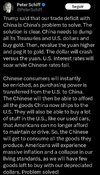In a recent live discussion featuring Professor Jeffrey Sachs, the complexities surrounding the ongoing tariff wars and their implications for global trade were explored. The conversation, hosted by Alexander Mercurus, delved into the motivations behind the tariffs imposed by the Trump administration and the potential economic consequences.
The Context of Tariff Wars
As the discussion began, Mercurus noted that Sachs was joining from New Delhi, India, where he was likely caught in traffic. The conversation quickly shifted to the topic of tariffs, particularly those affecting countries like China and Vietnam. Mercurus pointed out that Vietnam had attempted to negotiate zero tariffs on American goods, but the U.S. response indicated that such offers were insufficient due to non-tariff barriers that still existed.
Sachs emphasized that the current tariff policies are not merely tactical maneuvers but could signify a fundamental shift in the U.S. trade system. He expressed concern that these tariffs, if sustained, would not yield the desired economic outcomes for the United States.
Misguided Economic Policies
Sachs articulated that the rationale behind the tariffs, which is often framed as a response to other countries "ripping off" the U.S., is fundamentally flawed. He explained that trade deficits are not necessarily indicative of unfair trade practices but rather reflect a country's spending habits.
Understanding Trade Deficits
According to Sachs, a trade deficit occurs when a country spends more than it earns. This imbalance can arise from various factors, including government spending and investment patterns, rather than the trade policies of other nations. He noted that the U.S. has been running chronic budget deficits, which contribute to its trade deficits.
Sachs criticized the simplistic view that imposing tariffs would rectify these imbalances, arguing that such measures ignore the broader economic dynamics at play. He stated, "A current account deficit means that a country is spending more than it is earning," and that tariffs would not address the underlying issues.
The Economic Consequences of Tariffs
Sachs warned that the imposition of tariffs could lead to several adverse effects:
- Retaliation from Other Countries: Countries affected by U.S. tariffs, particularly China, are likely to retaliate, which could further diminish U.S. exports.
- Increased Prices for Consumers: Tariffs on imported goods would raise prices for American consumers, potentially lowering living standards rather than improving them.
- Disruption of Supply Chains: The U.S. economy relies on global supply chains, and tariffs could disrupt these networks, leading to inefficiencies and increased costs.
He argued that the tariffs would not only fail to reduce the trade deficit but could also lead to a recession in the U.S. economy, as higher prices and reduced exports take their toll.
The Geopolitical Landscape
The conversation also touched on the geopolitical implications of the tariff wars. Sachs noted that the U.S. seems to be positioning itself against China, viewing its rise as a threat to American dominance. This perspective could lead to a more fragmented global economy, with countries forming economic blocs in response to U.S. policies.
Sachs referenced historical precedents, such as the Smoot-Hawley Tariff of 1930, which exacerbated the Great Depression by stifling international trade. He cautioned that the current trajectory could similarly destabilize the global economy.
Conclusion: A Call for Thoughtful Trade Policies
In conclusion, Professor Sachs urged for a reevaluation of the current tariff policies, advocating for a more nuanced understanding of trade dynamics. He emphasized that trade should be viewed as mutually beneficial, where both sides can gain from economic exchanges. The ongoing tariff wars, he argued, risk not only economic harm but also the potential for increased geopolitical tensions.
As the discussion wrapped up, it became clear that the path forward requires careful consideration of the economic and political ramifications of trade policies. The insights shared by Sachs serve as a critical reminder of the complexities involved in international trade and the need for cooperative approaches rather than confrontational ones.


